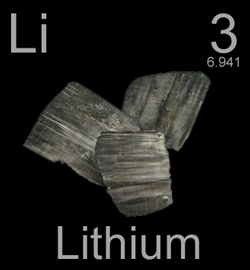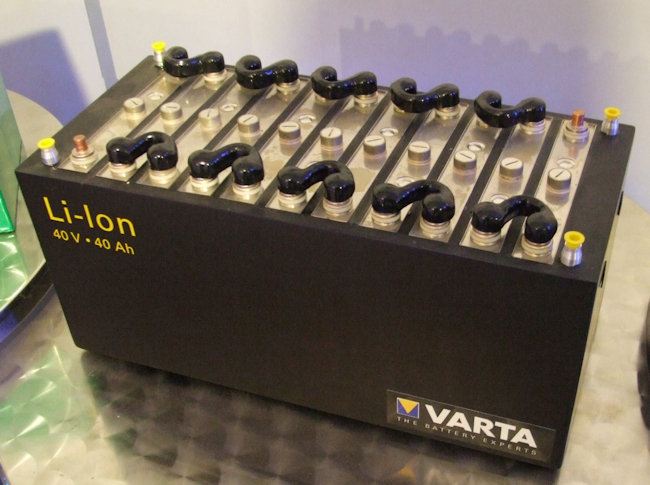 Nevada is booming as new lithium companies rush in to stake out targets and massive business development gets underway, from Tesla to Amazon and Apple. As the state’s southwest corner fills up with new lithium players, Tesla gears up for its battery gigafactory and the world’s largest data center sets up shop, Nevada is poised for one of the greatest economic revival stories of the century.
Nevada is booming as new lithium companies rush in to stake out targets and massive business development gets underway, from Tesla to Amazon and Apple. As the state’s southwest corner fills up with new lithium players, Tesla gears up for its battery gigafactory and the world’s largest data center sets up shop, Nevada is poised for one of the greatest economic revival stories of the century.
In an exclusive interview with Oilprice.com, Brian Findlay, President and CEO of Dajin Resources Corp., discusses:
• How Tesla’s gigafactory is sparking a massive resurgence in Nevada
• Why other giant businesses are setting up shop here
• Why Nevada is ground zero for the lithium boom
• Why Reno will be the New Las Vegas
• What it all means for economic development and job creation
• The rush to stake out lithium targets, and the big names that are interested
• The few options left to get in on this game
• Who got there first, and where it’s all going
Oilprice.com: The first thing that used to come to everyone’s mind with any mention of Nevada was Las Vegas and gambling. Today, however, we think of a lithium boom, of Tesla, and of economic recovery. Why is Nevada suddenly on everyone’s radar?
Brian Findlay: Particularly in the energy sector—but not exclusively—Nevada is one of the best places to be right now. The economic recovery that is going on here in Reno, but also statewide, is one of the best success stories of the decade. Not only is Tesla’s battery gigafactory creating an amazing resurgence, but other major factories are moving to the Tahoe Reno Industrial Center, which will house Switch, the world’s largest data center, along with some other huge names in the industry, including Amazon and Apple. The real estate market is on the upswing as a result of all of this activity, and this is only the beginning of the revival.
Oilprice.com: Can we get more specific about the impact from Tesla’s gigafactory?
Brian Findlay: First of all, this will be a fantastic market for job-seekers. This $5 billion factory will create some 9,000 jobs-and that’s based on figures from Nevada’s Office of Economic Development. Of those, the gigafactory will employ around 6,500 people directly when it’s up and running. Indirectly, we’re looking at the creation of over 16,000 new jobs. And because of the additional economic development the whole idea of the gigafactory has brought to Nevada, authorities in western Nevada estimate that Wahoe County, encompassing Reno and Sparks, will see 34,000 new jobs by 2019.
Oilprice.com: So on a larger scale, what kind of add-on economic development are we looking at?
Brian Findlay: On a much larger scale, it turns Reno into a significant attraction for other big businesses with expansion ambitions. In terms of economic development, it doesn’t get much bigger than this. Bloomberg estimates Tesla has already $800 million in battery reservations in the very first week of pre-order program, and this summer it tripled its land hold for the factory, adding another 2,000 acres to the 1,000 acres it originally scooped up. In fact, Bloomberg suggests that Tesla’s gigafactory is the biggest thing to happen to Nevada since the silver rush of the 1850s and the gaming boom centered on Las Vegas.
Oilprice.com: Year-on-year, what can we expect from this economic development? Where will this be in two decades?
Brian Findlay: There are all kinds of indicators out there—all of them impressive. One that really sticks out is the prognosis that Tesla’s gigafactory is expected to generate $97 billion economic activity in the Reno area alone over the next 20 years. But there are other immediate indicators that are also impressive, including the fact that Reno/Sparks housing prices are up 19 percent. The trickle-down effect has already been extensive, leading new business to flood into Reno, as I mentioned earlier. The Switch data center covers a massive 6.5 million square feet. When it’s completed, the 400 new permanent jobs it creates along with the 5,000 additional jobs for companies that use the data center’s services will add to the already burgeoning consumer purchasing power. This snowball-effect business development changes the game for Nevada entirely.
Oilprice.com: Ok, so why Nevada specifically? Why is this ground zero for Tesla’s gigafactory and the resulting economic development?
Brian Findlay: For Tesla, it’s all about Nevada because of the state’s lithium resources. It is no coincidence that Nevada is rich in lithium and that Tesla had stated that it wanted to source raw materials locally—not to mention that Nevada is the site of the only producing lithium mine in North America. But even more than this, Nevada is a mining-friendly state. The state’s authorities understand what is at stake here and the economic development prospects, which is why Tesla got a tax break.
Oilprice.com: How much lithium is Nevada sitting on?
Brian Findlay: Nevada’s lithium resources are second only to those in Chile, according to the Nevada Governor’s Office of Economic Development. Beyond this, Nevada has a rich mining history. Not only is it ranked 1st in mining the U.S., but it’s 3rd in the world. It also accounts for 80 percent of total U.S. silver output. This unique lithium position has turned Nevada into a lithium hub, and companies are now racing to stake out potential targets. In fact, the south western Nevada lithium space has even recently attracted the attention of well-known investor and philanthropist Frank Giustra, who is not only a financier, but also the founder of LionsGate films and friends with Bill Clinton.
Oilprice.com: So we all know that lithium is what you would call an everyday mineral, but we tend to take it for granted. Why lithium? Why is it so important in this context?
Brian Findlay: Lithium is the key ingredient in batteries. It’s the preferred mineral for batteries because it has the highest electric output per unit weight. Supplies are thinning and demand—already attractive—is poised for a major spike. This new demand will be driven by grid storage, the ‘powerwall’ and electric/hybrid vehicles. Just one of the planned battery gigafactories could need upwards of 15,000 tons of lithium carbonate right from the start—just to put the emerging demand picture into perspective. Beyond this, the demand for electric vehicles is growing based on environmental awareness, price and newfound convenience. Prices are now starting to reflect lithium’s rise, with one of the world’s largest producers, FMC, recently raising the price of lithium hydroxide across the board to $10,750 per ton. While other minerals are floundering in this market, lithium demand and prices remain strong.
Oilprice.com: While not directly related to lithium, do you have any comments on the ‘dieselgate‘ scandal involving VW’s alleged cheating on emissions standards, and how this might affect the electric/hybrid vehicle market?
Brian Findlay: Certainly this is another feather in lithium’s cap and it could indeed further the forward movement towards electric vehicles. Volkswagen will have to undergo a very costly reinvention and all companies are going to have to deal with emissions issues as consumers and lawmakers become more focused on reducing greenhouse gas emissions and reducing climate change. This is good news for both lithium and the electric car industry.
Oilprice.com: Ok, let’s swing back to Nevada. What shifts have we already seen in the lithium sphere that further indicates where this is all going?
Brian Findlay: There has been a significant spill over effect so far. That the lithium race is on is most poignantly indicated by Albemarle’s acquisition for $6.2 billion of the Rockwood Lithium mine in western Nevada. Rockwood Lithium is North America’s only producing lithium mine, and it’s been in production since 1967. Another recent supply off-take agreement between a relatively small junior mining company and Tesla is also a strong indicator of where this is all going.
Oilprice.com: What does all this movement mean for junior lithium miners in general?
Brian Findlay: Listen, Western Nevada is now a hot bed of activity in the lithium sector, and the lithium-staking rush is moving ahead at full speed. Not only is this having a major impact on the local economy, but it’s making it much easier for smaller companies to raise exploration money. This, in turn, is helping junior companies to flourish into more significant companies, further creating new jobs and further boosting the economy. Joint ventures are happening, and they’re happening quickly.
Oilprice.com: How does Dajin Resources Corp. play into this lithium rush?
Brian Findlay: Dajin is a resource exploration company focused on the exploration and development of energy metal projects with strategically located brine-based lithium targets in Argentina and Nevada. Dajin has two 100 percent-owned projects in Nevada just a short distance from Albemarle’s Rockwood Lithium Mine.
Oilprice.com: Now that the target-staking is on in Nevada, how hard is it to break into lithium?
Brian Findlay: The bigger picture here is that in such a weak commodities market, there are only a few ways to get involved in the lithium space, and Dajin is ahead of many of the new exploration companies because it was one of the first to make inroads into Nevada. Dajin has been quietly acquiring strategic lithium properties and is well underway with its exploration program. At the end of the day, fueled by vision and foresight, Dajin has continued to advance while commodities have tumbled.
By James Stafford of Oilprice.com



